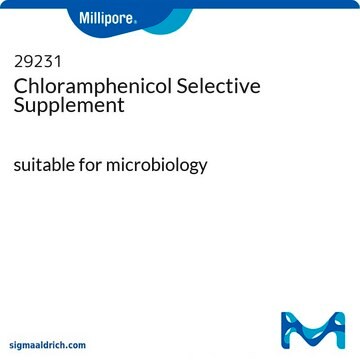SBR00068
Streptomycin Ready Made Solution
100 mg/mL in water
Se connecterpour consulter vos tarifs contractuels et ceux de votre entreprise/organisme
About This Item
Produits recommandés
Forme
liquid
Niveau de qualité
Activité spécifique
(Antibacterial)
Concentration
100 mg/mL in water
Spectre d'activité de l'antibiotique
Gram-negative bacteria
Gram-positive bacteria
mycobacteria
Mode d’action
protein synthesis | interferes
Température de stockage
−20°C
Description générale
Chemical structure: aminoglycoside
Application
Streptomycin is used to study mechanisms of streptomycin resistance and is often used together with penicillin and other agents to inhibit bacterial contamination in cell culture applications. It is recommended for use in molecular biology applications at 25-50 μg/mL, in cell culture applications at 100 mg/L and in embryo culture at 50 mg/L.
Actions biochimiques/physiologiques
Mode of Action: Streptomycin acts by inhibiting prokaryote protein synthesis by binding to the S12 protein of the 30S ribosomal subunit, thus preventing the transition from imitation complex to chain-elongating ribosome. This causes miscoding or inhibits initiation.
Mode of Resistance: A mutation in rpsL, a gene for S12 ribosomal protein, prevents binding of streptomycin to the ribosome. An aminoglycoside phosphotransferase also inactivates streptomycin.
Antimicrobial spectrum: Streptomycin acts against gram-negative and gram-positive bacteria.
Mode of Resistance: A mutation in rpsL, a gene for S12 ribosomal protein, prevents binding of streptomycin to the ribosome. An aminoglycoside phosphotransferase also inactivates streptomycin.
Antimicrobial spectrum: Streptomycin acts against gram-negative and gram-positive bacteria.
Stockage et stabilité
- Streptomycin ready made solution contains 100 mg/mL streptomycin sulfate in water.
- Streptomycin: sulfate salt ratio is 1:1.5.
- The product is packed under aseptic conditions.
Mention d'avertissement
Warning
Mentions de danger
Conseils de prudence
Classification des risques
Repr. 2
Code de la classe de stockage
10 - Combustible liquids
Classe de danger pour l'eau (WGK)
WGK 3
Certificats d'analyse (COA)
Recherchez un Certificats d'analyse (COA) en saisissant le numéro de lot du produit. Les numéros de lot figurent sur l'étiquette du produit après les mots "Lot" ou "Batch".
Déjà en possession de ce produit ?
Retrouvez la documentation relative aux produits que vous avez récemment achetés dans la Bibliothèque de documents.
Daniela Lobenwein et al.
Journal of the American Heart Association, 4(10), e002440-e002440 (2015-10-29)
Paraplegia following spinal cord ischemia represents a devastating complication of both aortic surgery and endovascular aortic repair. Shock wave treatment was shown to induce angiogenesis and regeneration in ischemic tissue by modulation of early inflammatory response via Toll-like receptor (TLR)
Rabia T Khan et al.
PloS one, 9(2), e88009-e88009 (2014-02-08)
Experimental animal models of Salmonella infections have been widely used to identify genes important in the host immune response to infection. Using an F2 cross between the classical inbred strain C57BL/6J and the wild derived strain MOLF/Ei, we have previously
Jiayun Zhu et al.
Cell cycle (Georgetown, Tex.), 14(12), 1809-1822 (2015-06-18)
Fanconi Anemia (FA) is a cancer predisposition syndrome and the factors defective in FA are involved in DNA replication, DNA damage repair and tumor suppression. Here, we show that FANCD2 is critical for genome stability maintenance in response to high-linear
Carlotta Alias et al.
Journal of cellular and molecular medicine, 19(9), 2098-2107 (2015-05-27)
Gynaecological leiomyosarcoma (gLMS) represent a heterogeneous group of soft tissue sarcoma, characterized by rare incidence, high aggressiveness and propensity to infiltrate secondary organs, poor prognosis and lethality, because of the lack of biological mechanisms that underlying their progression and effective
Marimuthu Subathra et al.
American journal of physiology. Renal physiology, 309(3), F204-F215 (2015-06-05)
Glycosphingolipids (GSLs) play a role in insulin resistance and diabetes, but their role in diabetic nephropathy (DN) has received limited attention. We used 9- and 17-wk-old nondiabetic db/m and diabetic db/db mice to examine the role of GSLs in DN.
Notre équipe de scientifiques dispose d'une expérience dans tous les secteurs de la recherche, notamment en sciences de la vie, science des matériaux, synthèse chimique, chromatographie, analyse et dans de nombreux autres domaines..
Contacter notre Service technique





